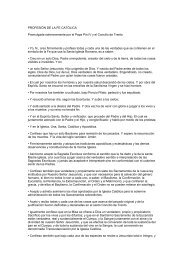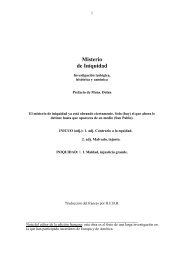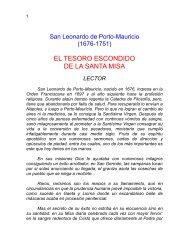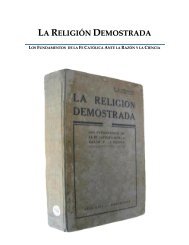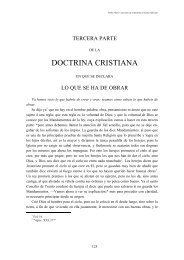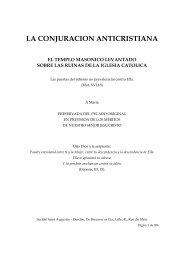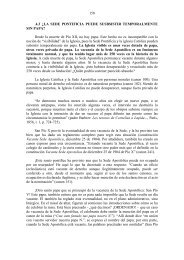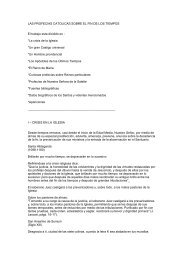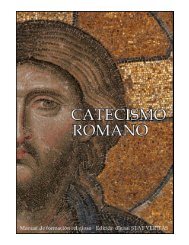Iglesia y_Vaticano_II - amor de la verdad
Iglesia y_Vaticano_II - amor de la verdad
Iglesia y_Vaticano_II - amor de la verdad
You also want an ePaper? Increase the reach of your titles
YUMPU automatically turns print PDFs into web optimized ePapers that Google loves.
Las Herejías <strong>de</strong>l <strong>Vaticano</strong> <strong>II</strong> 80<br />
Afortunadamente, el Papa Pío X<strong>II</strong> y el Concilio <strong>de</strong> Trento ya habían con<strong>de</strong>nado cualquier inserción <strong>de</strong><br />
tradición musical profana en <strong>la</strong>s iglesias.<br />
Papa Pío IV, Concilio <strong>de</strong> Trento, sesión 22, <strong>de</strong>creto sobre <strong>la</strong>s cosas que <strong>de</strong>ben ser<br />
observadas y evitadas en <strong>la</strong> misa: “Y <strong>de</strong>ben mantener fuera <strong>de</strong> sus iglesias el tipo <strong>de</strong><br />
música en que se introducen elementos autóctonos y sugestivos en el órgano y el<br />
canto, y lo mismo <strong>de</strong> todas <strong>la</strong>s activida<strong>de</strong>s mundanas, conversaciones vacías y<br />
profanas, caminatas, ruidos y gritos, para que <strong>la</strong> casa <strong>de</strong> Dios pueda<br />
verda<strong>de</strong>ramente ser l<strong>la</strong>mada así sea vista como casa <strong>de</strong> oración…‖ 141 .<br />
Papa Pío X<strong>II</strong>, Musicae sacrae, # 42, 25 <strong>de</strong> diciembre <strong>de</strong> 1955: “[Sobre <strong>la</strong> música<br />
litúrgica] Debe ser santa. No <strong>de</strong>be permitirse <strong>de</strong>ntro <strong>de</strong> el<strong>la</strong> nada que tenga sabor<br />
profano, ni permitirse cosa parecida en <strong>la</strong>s melodías en que el<strong>la</strong> se expresa‖ 142 .<br />
¿Hay alguna duda <strong>de</strong> que el <strong>Vaticano</strong> <strong>II</strong> trató <strong>de</strong> producir una nueva liturgia apóstata para su nueva<br />
<strong>Iglesia</strong> apóstata? El <strong>Vaticano</strong> <strong>II</strong> hace caer el anatema <strong>de</strong> <strong>la</strong> <strong>Iglesia</strong> sobre su cabeza.<br />
Papa Pablo <strong>II</strong>I, Concilio <strong>de</strong> Trento, sesión 7, canon 13, ex cathedra:<br />
“Si alguno dijere que los ritos recibidos y aprobados <strong>de</strong> <strong>la</strong> <strong>Iglesia</strong> Católica que<br />
suelen usarse en <strong>la</strong> solemne administración <strong>de</strong> los sacramentos, pue<strong>de</strong>n <strong>de</strong>spreciarse<br />
o ser omitidos, por el ministro a su arbitrio sin pecado, o mudados en otros por<br />
obra <strong>de</strong> cualquier pastor <strong>de</strong> <strong>la</strong>s iglesias, sea anatema‖ 143 .<br />
Hay otras herejías en los documentos <strong>de</strong>l <strong>Vaticano</strong> <strong>II</strong>. Sin embargo, lo que ha sido cubierto <strong>de</strong>bería<br />
ser suficiente para convencer a cualquiera <strong>de</strong> buena voluntad que ningún católico <strong>de</strong> buena voluntad<br />
pue<strong>de</strong> aceptar este concilio herético sin negar <strong>la</strong> fe. Y no basta con resistir <strong>la</strong>s herejías <strong>de</strong>l <strong>Vaticano</strong> <strong>II</strong>;<br />
se <strong>de</strong>be con<strong>de</strong>nar por completo este concilio no-católico y a todos los que obstinadamente<br />
adhieren a sus enseñanzas. Porque si una persona rechaza <strong>la</strong>s herejías <strong>de</strong>l <strong>Vaticano</strong> <strong>II</strong>, y aún así se<br />
consi<strong>de</strong>ra en comunión con aquellos que aceptan <strong>la</strong>s herejías <strong>de</strong>l <strong>Vaticano</strong> <strong>II</strong>, entonces esa persona<br />
sigue estando en realidad en comunión con los herejes y, por lo tanto, es un hereje.<br />
Notas <strong>de</strong> <strong>la</strong> Sección 8:<br />
1 Yves Marsaudon en su libro Ecumenism Viewed by a Traditional Freemason [El Ecumenismo visto por un Masón<br />
Tradicional] edición inglesa, Paris: Ed. Vitiano, 121; citado por Permanences [Permanencia], edición inglesa, no. 21<br />
(julio <strong>de</strong> 1965), 87; también citado por el Obispo Tissier De Mallerais, The Biography of Marcel Lefebvre [La<br />
Biografía <strong>de</strong> Marcel Lefebvre], edición inglesa, Kansas City, MO: Angelus Press, 2004, p. 328.<br />
2 Denzinger, The Sources of Catholic Dogma [El Magisterio <strong>de</strong> <strong>la</strong> <strong>Iglesia</strong>], B. Her<strong>de</strong>r Book Co. trigésima edición<br />
inglesa, 1957, no. 703-705.<br />
3 Walter M. Abbot, The Documents of Vatican <strong>II</strong> [Los Documentos <strong>de</strong>l <strong>Vaticano</strong> <strong>II</strong>], edición inglesa, The America<br />
Press, 1966, p. 666.<br />
4 Decrees of the Ecumenical Councils [Los Decretos <strong>de</strong> los Concilios Ecuménicos], edición inglesa, Sheed & Ward<br />
and Georgetown University Press, 1990, vol. 1, p. 970.<br />
5 Versión <strong>la</strong>tina <strong>de</strong> 1937 <strong>de</strong> Denzinger, Enchiridion Symbolorum, Her<strong>de</strong>r & Co., no. 705.<br />
6 Decrees of the Ecumenical Councils, edición inglesa, 1990, vol. 2, p. 908.<br />
7 http://www.vatican.va/archive/hist_councils/ii_vatican_council/documents/vatii_<strong>de</strong>cree_19641121_unitatis-redintegratio_sp.html<br />
8 The Papal Encyclicals [Las Encíclicas Papales], edición inglesa, <strong>de</strong> C<strong>la</strong>udia Carlen, Raleigh: The Pierian Press,<br />
1990, vol. 2 (1878-1903), p. 393.<br />
9 Renee M. Lareau, ―Vatican <strong>II</strong> for Gen-Xers‖, St. Anthony Messenger, edición inglesa, noviembre <strong>de</strong> 2005, p. 25.<br />
10 Decrees of the Ecumenical Councils, edición inglesa, 1990, vol. 2, p. 912.<br />
11 ―Car<strong>de</strong>nal‖ Ratzinger, Dominus Iesus #17, aprobado por el antipapa Juan Pablo <strong>II</strong>, 6 <strong>de</strong> agosto <strong>de</strong> 2000.<br />
12 Denzinger 570a.<br />
13 The Papal Encyclicals, edición inglesa, vol. 2 (1878-1903), p. 393.



